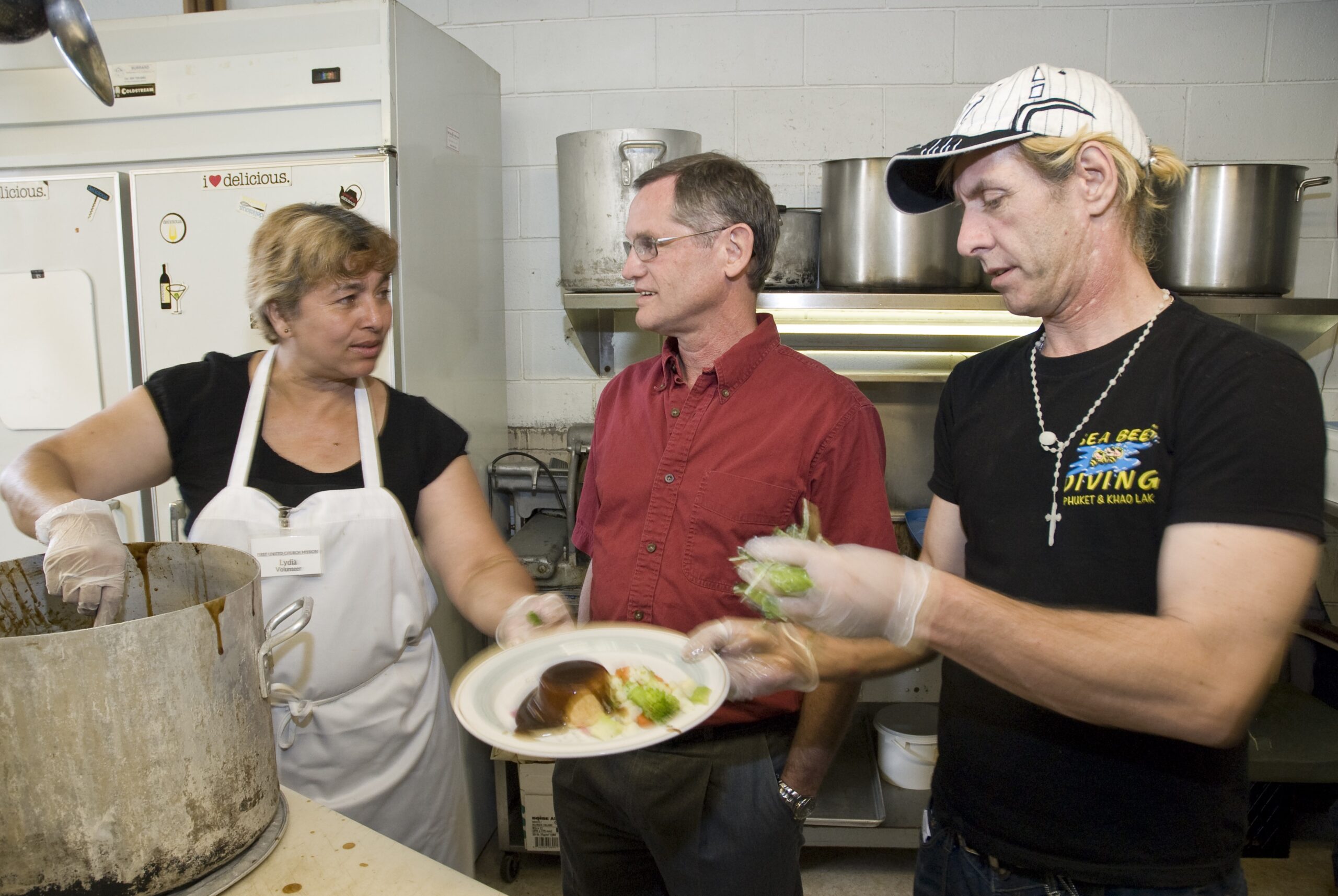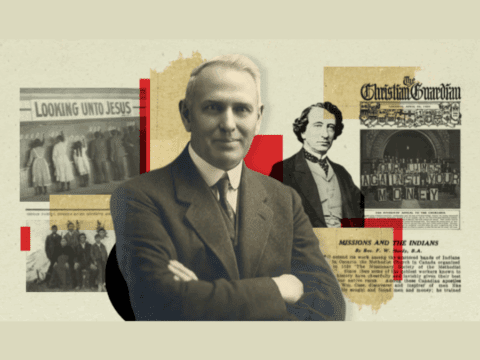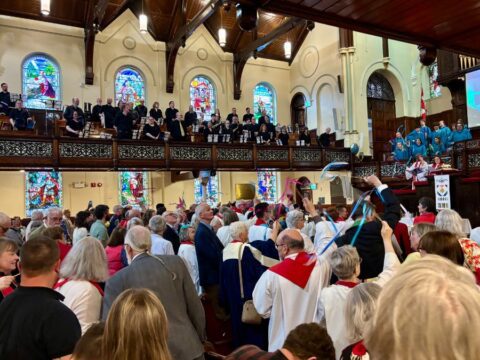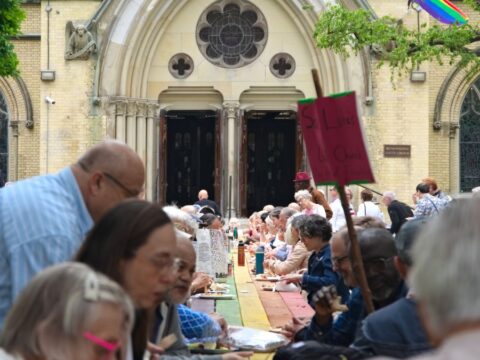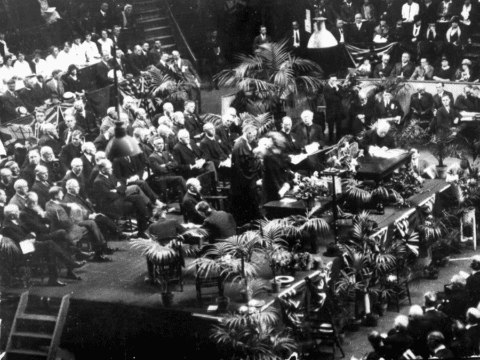It’s midnight, shortly before Christmas. Strings of Christmas lights hang down the dingy exterior walls of First United Church on Vancouver’s East Hastings Street. A couple smokes on the stairs outside the front entrance. Inside, people chat in small groups. Others sleep on bunk beds in the former sanctuary — a gathering of warm, still bodies on a cold, damp night.
This peacefulness contrasts starkly with the meltdown that took place earlier in the day, when the mission’s three most senior staff — executive minister Rev. Ric Matthews, deputy executive minister Rev. Sandra Severs and director of operations Gillian Rhodes — all resigned.
The resignations, the culmination of problems that had been brewing throughout 2011 — First United’s 125th anniversary year, as it happens — led to aftershocks that spell uncertainty for the iconic United Church mission in Canada’s poorest neighbourhood.
“It would be such a sad mistake to gloss over what happened,” Matthews says in a Downtown Eastside coffee shop about a month after he resigned.
During his four years as executive director, he worked to make First United an “integrated, inclusive Christian community at the margins of society.” In practical terms, that meant turning the church sanctuary into a 200-bed dormitory and offering shelter to the Downtown Eastside’s most marginalized people, even those turned away by other shelters because they’re known to be violent or have criminal pasts.
Matthews insists his vision was foiled by zealous government bureaucrats, the church’s institutional inflexibility and the fear of litigation.
“It’s been rough, but there’s such an opportunity to seize the gems in this messiness,” he says.
“Messiness” might be putting it mildly. First United was awash in conflict throughout 2011.
In the spring, a coalition of inner-city women’s groups slammed the mission in the media for allegedly creating conditions that led to multiple sexual assaults on the property. According to a Vancouver-Burrard Presbytery report late last year, 13 sexual assaults at the mission were reported to Vancouver police in 2011. Overall, according to the same report, police were summoned to First United more than 700 times last year. The next largest shelter in the city, with 100 beds, made 61 calls to police.
Reporting on the assaults in March, the Vancouver Province newspaper quoted Matthews as stating, “Some women put themselves at risk because of the way they dress or undress or move around the building drawing attention to themselves.”
Those comments prompted more critical articles in city papers. In response, Matthews said his remarks had been misconstrued — he wasn’t blaming the women but was trying to draw attention to the extreme behaviour that sometimes occurs inside First United.
A few weeks later, the media questioned First United’s decision to hire a convicted sex offender on a conditional sentence to work the overnight shift at the shelter. Since then, the employee has been on leave without pay.
Then on Nov. 30, Matthews, Severs and the Vancouver fire department had a showdown. After months of telling the mission’s administration to comply with the fire code occupancy limit of 240 people, and Matthews and Severs resisting (arguing there was nowhere safe to send the overflow), the fire department issued an ultimatum. Either comply or fire officials would enter the building that night and force compliance.
For the first time in three years, First United locked its doors in the evening. Staff turned away 27 people. The showdown was front-page news.
Rev. David Ewart, a member of First United’s oversight committee appointed by British Columbia Conference, says that night was the first time he heard about the fire department’s concerns — in an e-mail from Matthews sent at 10:19 p.m.
Two days later, Ewart sent an e-mail to First United’s board of directors and others. In the message, he criticized Matthews’s actions on the night of Nov. 30, stating that the violation of the fire code put lives at risk and could nullify the church’s insurance. Ewart also took the senior staff at First United to task for not sharing the fire department’s longstanding concerns.
But he also wrote that those in a position to ask questions failed to do so.
“With the brilliance of the vision that 20-20 hindsight provides, it strikes me that we — not Ric [Matthews] or Sandra [Severs] — made a collective blunder when we agreed to host Vancouver’s largest shelter with about 48 hours notice. No one seems to have asked then: What are the professional competencies needed to run such a shelter? Who among us has those competencies?”
Soon afterwards, BC Housing, which had an agreement with First United to operate the shelter, announced it would end the arrangement a year early and withdraw $240,000 a month in funding. The cutoff, which could come at the end of this month, would likely mean layoffs for many of the mission’s 80 employees.
On Dec. 16, both Vancouver-Burrard Presbytery and BC Housing ordered Matthews and Severs to comply with the terms of the shelter contract within one week.
Refusing to comply, Matthews and Severs resigned four days later.
The troubles at First United have not been confined to the mission. The First United Church Housing Society (FUCHS), which for nearly 30 years has been managing three apartment buildings in partnership with BC Housing, has opted to give up two of those buildings, citing an unworkable funding formula and crumbling facilities.
Recently resigned FUCHS board member Tom Beasley explains that the problems at both First United and the housing society stem from a refusal to exclude the most marginalized. At the two buildings in question, management rented apartments to people who were hard to house. Over time, he says, choosing to serve everyone led to more damage and deterioration than the existing funding could cover.
“The problems here go way past Ric [Matthews] to systemic issues,” Beasley says.
The net result of all the upheaval is dramatic: of the 450 shelter beds and apartments First United managed at the start of 2011, all but 33 units will likely leave United Church hands this year. While other critical parts of First’s mission remain unchanged — advocacy, meal programs, foot care, a dental clinic and other outreach — the mission is in a massive and uncomfortable transition. For the second time in five years, Vancouver-Burrard Presbytery is trying to develop a new vision for First United.
First United isn’t the only church-affiliated housing and shelter provider in the Downtown Eastside. But it was the only provider to transform a church sanctuary into a shelter. The Salvation Army, by contrast, operates 185 shelter beds and 44 transitional suites. Catholic Charities offers a 102-bed men’s hostel and extensive residential health care.
The Anglican St. James Community Service Society, which operates just down the street from First United, provides 271 shelter beds and apartments. In 2011, the City of Vancouver asked St. James to also manage 95 units of new affordable housing in the neighbourhood. Furthermore, in May 2010, the society announced it had rounded up the funding for a $30.5-million building, with 89 units of supported housing, in partnership with government and foundations.
In 2011, Union Gospel Mission also opened a $29-million multi-purpose building nearby. It offers 183 beds, including shelter and affordable housing, plus food, detox and other services.
Matthews and Severs had similar plans for First United — a $30-million development that would have brought shelter space, affordable housing and a wide range of community services under one roof. The project is now on hold.
But the people now in leadership at the mission insist that recent events mark the end of a chapter at First United, not the end of the First United story itself.
“There’s lots of hope here,” said Don Evans, an energetic and thoughtful former biotech executive who stepped into the role of First’s co-executive director after Matthews resigned. “My hope as we transition through this period is that we’ll find as many people permanent housing as possible, and that the people who are left [on March 31], we can continue providing shelter for,” he said before accepting a one-year appointment as executive director of the United Church-linked Our Place Society in Victoria.
Evans had worked at the mission for the past three years, alongside veteran First United employee Stephen Gray, who was named new co-executive director. The senior management team is responsible for keeping the shelter going in the near term while complying with BC Housing, as well as for overseeing the closing of the shelter and helping to re-energize the mission’s long-standing work in the neighbourhood.
Evans said the spate of negative publicity had hurt First United’s fundraising efforts. “We have lots of rebuilding to do with community, government and church,” he said. “No one wants people on the streets.”
***
This story first appeared in The United Church Observer’s March 2012 issue with the title “First United’s time of trial.”

